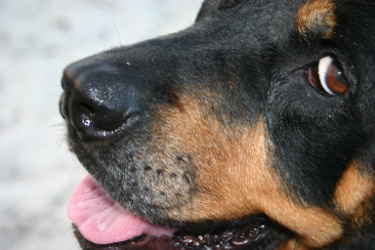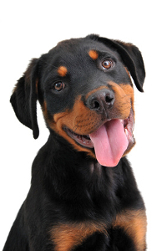When it comes to Rottweiler temperament, there’s often a fair bit of confusion and some conflicting ideas.
In This Article You Will Read About

Much of the behavior, and many of the characteristics, often attributed to Rottweilers are based on inaccurate information, and a lack of understanding of the nature of the Rottweiler breed.
Before we take a closer look at Rottweiler temperament and behavior, perhaps it would be a good idea to find out exactly what exactly the word ‘temperament’ means……
The Websters Dictionary defines ‘temperament’ as
‘Personality; a characteristic way of thinking, reacting or behaving’.
So, at its roots, Rottweiler behavior is the result of the general characteristics and personality of the breed.
Of course, no two dogs are created identical and there are always going to be variations between individuals, even among pups from the same litter.
Also, the ‘nature v nurture’ argument applies just as much to raising dogs as it does to raising children.
There’s no doubt in my mind that external forces and experiences can ‘shape’ Rottweiler behavior, just as strongly as the genetic influence of his/her parents does.
For example, a fearful, anxious Rottweiler can be the result of breeding a congenitally fearful/anxious dog who then passes this personality trait onto his/her pups.
Equally, a once confident and friendly puppy born from two calm, confident parents, can become fearful or anxious due to lack of socialization, harsh training, abuse and many other factors/influences.
What Are The Correct Rottweiler Temperament Traits?
To really understand Rottweilers, and to learn how and why they behave the way they do, it’s important to look back at the origins of the breed, and the ‘blue-print’ that was laid down in those very early days.
If I had to pick out a handful of words to describe the Rottweiler temperament, I’d probably start with
- Steady
- Calm
- Loving
- Brave
- Loyal
- Intelligent
- People-oriented
……. and that’s just for starters! Now, lets compare those to the original Rottweiler temperament requirements given by the ADRK (Allgemeiner Deutscher Rottweiler Klub) –
‘… good natured, placid in basic disposition and fond of children. Very devoted, obedient, biddable and eager to work….. self assured, steady and fearless…’
I love this description of the Rottweiler character, it gives a clear picture of the breeds overall approach to life.
Later on, as Rottweilers became popular across the world, other Rottweiler Breed Standards were written. Although the wording is slightly different in each version, the ‘big picture’ stays the same.
This is how the AKC (American Kennel Club) describes the desired Rottweiler temperament…
‘Calm, confident and courageous, with a self-assured aloofness….. an intelligent dog of extreme hardness and adaptability, with a strong willingness to work…’
When you look at the descriptions above, I think it’s pretty clear what the basic characteristics of Rottweiler temperament should be.
But of course, these are the IDEAL ROTTWEILER TEMPERAMENT traits, and it’s a sad fact that poor breeding practices combined with widespread misunderstanding and misconceptions about the breed, has resulted in many Rottweilers that don’t ‘fit’ this picture.
Rottweilers – The Link Between Temperament & Behavior
The early ancestors of today’s Rottweilers were used as herding/drover dogs, guardians, and companions.
They needed to be able to fill all these roles, and of course their owners relied on them to ‘come up with the goods’.
The dogs who were most useful and reliable, were the ones who were bred from, and this reinforced the desirable character traits. It’s exactly the same way today in the world of purebred dogs.
Every responsible and ethical breeder is trying to create their version of the ‘ideal’ representative of their chosen breed. One who fits in both appearance and temperament. And a very important part of this process is the issue of consistency and/or reliability.
Breeding stock has to RELIABLY produce puppies that are sound both physically and psychologically, and a ‘sound’ temperament means a dog should always react in the same way to a situation or event…. in other words ‘be reliable’.
Erratic behavior, or unreliable and unexpected reactions aren’t just undesirable, they’re dangerous. Particularly in a breed as big and strong as the Rottweiler, so I’d have to say that one of the most important Rottweiler temperament traits is a predictable response – and one that is in line with the Breed Standard requirements above.
This is especially important when it comes to the ‘guarding’ or protective instincts of the Rottweiler breed. Indiscriminate pro-active aggression, fearful or shy reactions, or a see-sawing between the two, are highly UN-desirable.
Rotties generally think things through, and they rarely use more force than is necessary to handle the situation. In my experience, they’ll bark or growl many warnings before they’ll feel it necessary to bite (thankfully mine have never needed to go that far!).
My dogs are both loving and affectionate with us and people they know.
They’re 120lb ‘goofballs’, who love nothing better than a belly-rub, but underneath that teddy-bear exterior, there’s the solid, tempered-steel Rottweiler temperament that would protect us with their lives.
They’ve been trained to listen to their humans, and to obey them.
They expect people and places to be safe and non-threatening, and they know how we expect them to behave.
All of those things, combined with good breeding and proper care, makes them a perfect fit in terms of the true Rottweiler temperament.
The Pro’s & Con’s Of Rottweiler Temperament

Much as I adore my Rotties, and I definitely think they’re the King (and Queen!) of breeds, they’re not angels or super-heros!
The downsides of the Rottweiler temperament can be a tendency towards stubborness and an inclination to ‘think things through’ rather than obey blindly.
They have a very real need to be right next to (and I mean RIGHT NEXT TO) the object, or person, of their affections and seem to have no idea of their own strength (or size).
Because of their size, power and intelligence, Rottweilers aren’t usually a good choice for first time dog owners, or people who are tiny, frail or lack self-confidence.
Also, although they make wonderful family pets (my 6 kids and my Rottweilers are one big happy family), if you have small children you may want to wait until they grow up some before adding a Rottie to your home.
This isn’t because the Rottweiler temperament is ‘mean’ or ‘aggressive’, (see my Are Rottweilers Dangerous? page for more on this) or because your dog may want to hurt your children, but it’s because they ARE big and strong (and often clumsy as adolescents).
Combine even a 50lb Rottweiler puppy who wants to play, with a 30lb unsteady-on-his-feet toddler and you’ll see what I mean.
If you want to learn even more about Rottweiler temperament and behavior, check out my Rottweiler Behavior page. You’ll also get more insight into this breed, including their history and personality, on my Rottweiler Dogs page.
The best Rottweiler temperament is a fascinating combination of strength and good nature, of power and self-control, of devotion and courage……….. what more could you ask of a dog?
Please take the time to browse through my site and enjoy all the wonderful photos and interesting information. The true Rottweiler is waiting to be found!
Related Pages….

